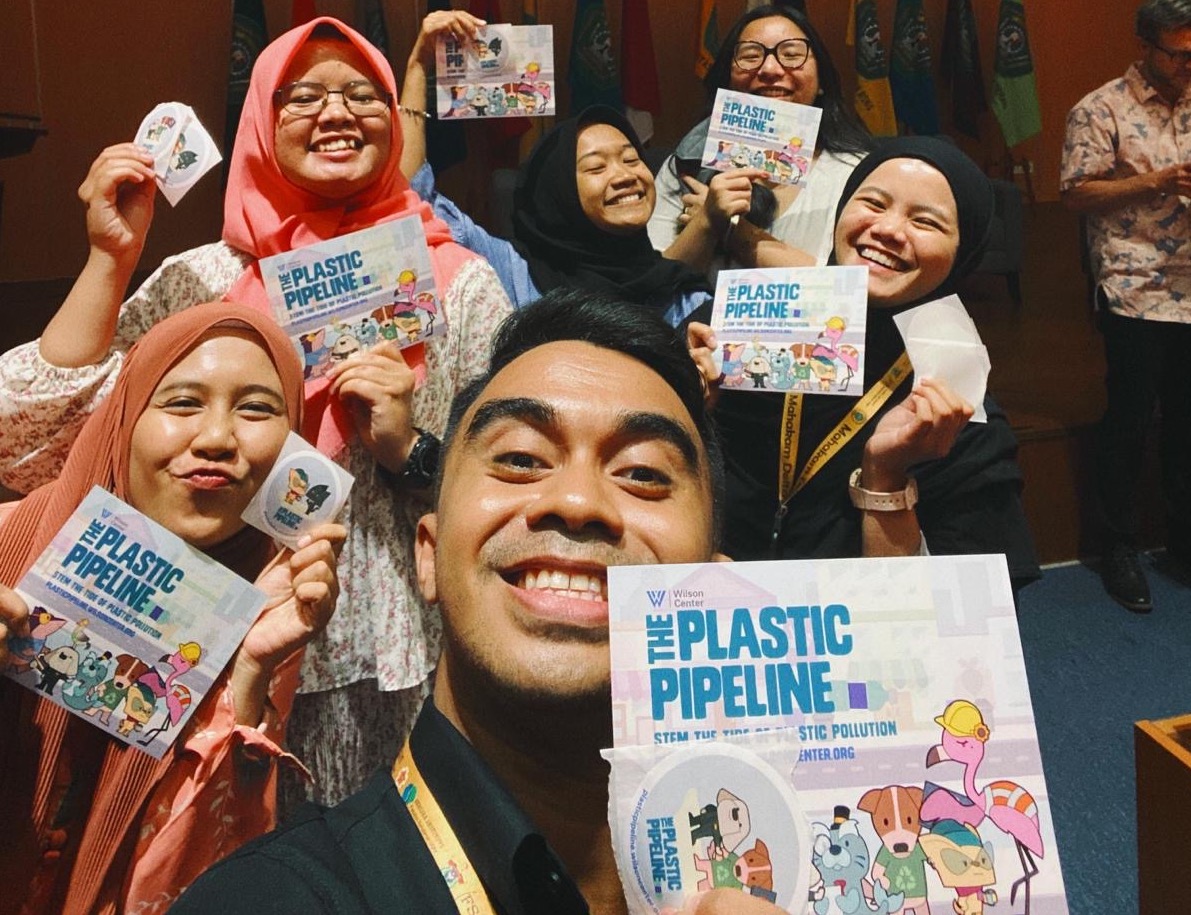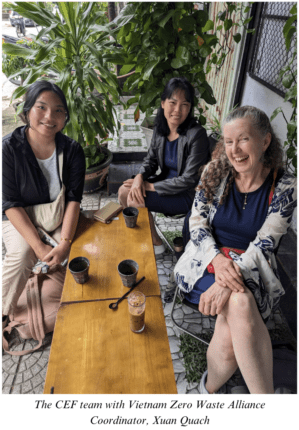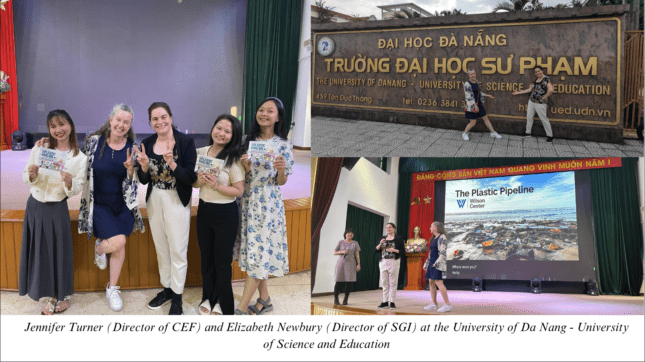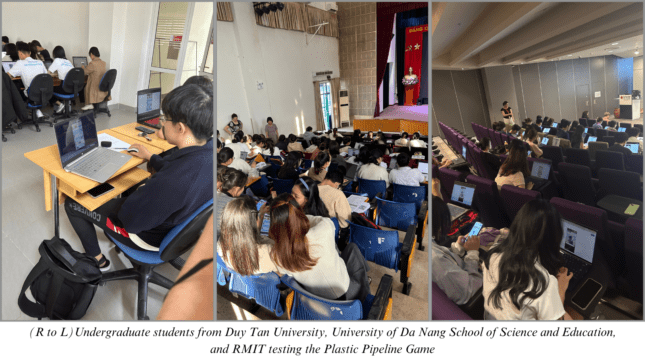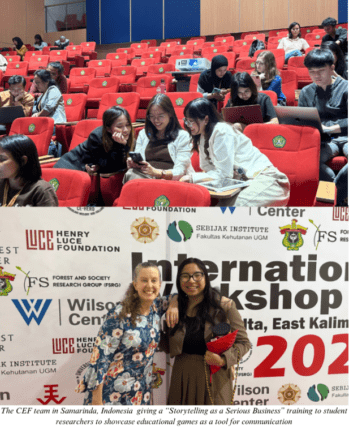-
The Power of Play with The Plastic Pipeline
April 18, 2024 By Jennifer NguyenDuring a visit to Vietnam in November 2023, I cringed as my aunt tossed our now empty bánh mì plastic bag onto the sidewalk. “It doesn’t really matter,” she shrugged, “there aren’t any nearby trash cans anyway.” Finding a trash can wouldn’t have helped much, as two-thirds of Vietnam’s plastic waste ends up burnt, landfilled, or leaked.
Vietnam is one of five countries responsible for 60% of ocean plastic pollution. Like the rest of the world, Vietnam has issued ambitious plastic reduction regulations and policies, but poor implementation and lack of waste infrastructure hinder progress towards a zero-waste society. Changing citizen behavior poses another challenge, as demonstrated by my aunt.
Nonetheless, I was excited to be in the region, not just for family, but also to demo The Plastic Pipeline game in Vietnam and Indonesia. This educational game, which is packed with cute animals and lots of information on plastic policies, was jointly produced by the Wilson Center’s Serious Games Initiative and China Environment Forum. Collaborating with the Vietnam Zero Waste Alliance (VZWA), we found three universities part of Zero Waste Education Network willing to participate. NGOs, advocates, and educators like VZWA have established an environmental education network in the region and are constantly looking for new ways to expand their reach and messaging.

Our game bridges the gap between gaming and understanding global plastic pollution, aiming to be a valuable tool for policymakers, educators, and environmental advocates. The goal is to not only educate on the severity of plastic pollution and potential policy solutions, but also motivate players to take real action once they’ve finished the game.
Hidden Gaming
We first showcased the game to students at Duy Tan University, University of Da Nang, and the Royal Melbourne Institute of Technology in Vietnam to gauge its suitability for non-US classrooms and to see if students learned something from the game.
As we walked into the classroom, we saw several students playing mobile games. But when we were introducing the game, students were hesitant to admit they played video games. This is despite Asia boasting more than half of the world’s gamers, with Indonesia, the Philippines, Thailand, and Vietnam ranking among the top 5 countries for internet users engaged in gaming. These nations are also among the top ten contributors to ocean plastic pollution globally.

Confused as to why, many students explained they “didn’t have time,” were “too mature” to play video games, or saw it as negatively impacting their studies. Students often responded that their studies took priority, feeling ambivalent towards video games and their value beyond entertainment. This saddened the Serious Games Initiative director, Elizabeth Newbury, who has a PhD in game studies!
It left us wondering about the nuance between the perception of gaming purely for recreation versus its potential as a tool for education and advocacy in Asia.
Sales Versus Stigmas
Asia is home to the world’s largest growing market for gaming and esports, but many youths in the region still grapple with stigmas around gaming. China, the world’s largest esports market, recently drafted a rule barring online games from encouraging daily logins from players. The rule is in line with previous crackdowns from the Xi Jinping administration that limited playtime for minors, similar to the now-repealed South Korean “Cinderella” law.
Fears of game addiction and poor academic performance drive these bans and stigmas towards video games, demonstrated by the students we met. Despite these attitudes, organizations like Games for Change Asia-Pacific have worked alongside Asian game studios dedicated to redefining what games can be — tools that can drive action in the real world. The US Department of State has acknowledged the transformative power of games by launching initiatives in the region such as the YSEALI Game Changers Regional Workshop in Malaysia and the YSEALI Marine Warriors Regional Workshop in Vietnam.
The Plastic Pipeline Takes on Southeast Asia
While in Vietnam and Indonesia, students and educators expressed concern for their respective countries’ plastic pollution problem. According to the World Bank, 3.1 million metric tons of plastic waste is “discharged on land in Vietnam” and 10% of that amount enters the ocean annually. Indonesia is only second to China as a global marine plastic litterer, and for the plastic waste that actually gets collected, 47% is openly burned.
In the three Vietnamese universities where we tested our game, players showed existing awareness of plastic pollution’s severity and impact. After playing, they reported increased knowledge, interest in environmental policy, and confidence in influencing policy. Although originally skeptical of games being a useful tool for learning, students felt the Plastic Pipeline was effective in educating them after playing. At the University of Da Nang, many primary education major students looked forward to the prospect of incorporating games into lesson plans on environmental protection.

During our Vulnerable Deltas workshop with the East-West Center in Indonesia, we presented the Plastic Pipeline game as part of our “Storytelling as a Serious Business” training for our Southeast Asian partners. Educational games are a creative way to communicate complex problems and generate learning. Their initial skepticism about games for education faded quickly away as the room grew rowdy with laughter as they played.
 In both countries, we received feedback that games like the Plastic Pipeline can be a valuable tool in educating and influencing the public, especially for students in primary through middle schools. Some were even excited to show the game to their younger siblings at home to encourage them to learn more about the environment.
In both countries, we received feedback that games like the Plastic Pipeline can be a valuable tool in educating and influencing the public, especially for students in primary through middle schools. Some were even excited to show the game to their younger siblings at home to encourage them to learn more about the environment. Leveling Up Climate Action
The Plastic Pipeline is in a growing ecosystem of environmental games, but civil society actors and educators are critical to mobilizing games that educate and spark change. Despite language barriers and initial reluctance towards gaming, our collaborators were invaluable in demonstrating the utility of serious games to participants.
This blog is part of the Wilson Center East-West Center Vulnerable Deltas project that is diving into climate, plastic waste, and development threats to three Southeast Asian and two Chinese deltas.
Jennifer Nguyen is the Program Coordinator for the China Environment Forum and is the managing editor for the China Environment Forum’s column on New Security Beat.
Sources: China Dialogue, CNBC, East-West Center, Engadget, Games For Change, Greenbook, Prensario Zone, Reuters, SEA Circular, Statista, The Conversation, Towson University Journal of International Affairs, U.S. Embassy & Consulate in Vietnam, U.S. Embassy in Malaysia, USAID, Vietnam Briefing, Vietnam Law Library, Visual Capitalist, World Bank
Lead Photo Credit: Jennifer Nguyen with Indonesian participants at the Vulnerable Deltas conference, photo courtesy of author
All Other Photo Credits: Photo courtesy of author
 A Publication of the Stimson Center.
A Publication of the Stimson Center.

